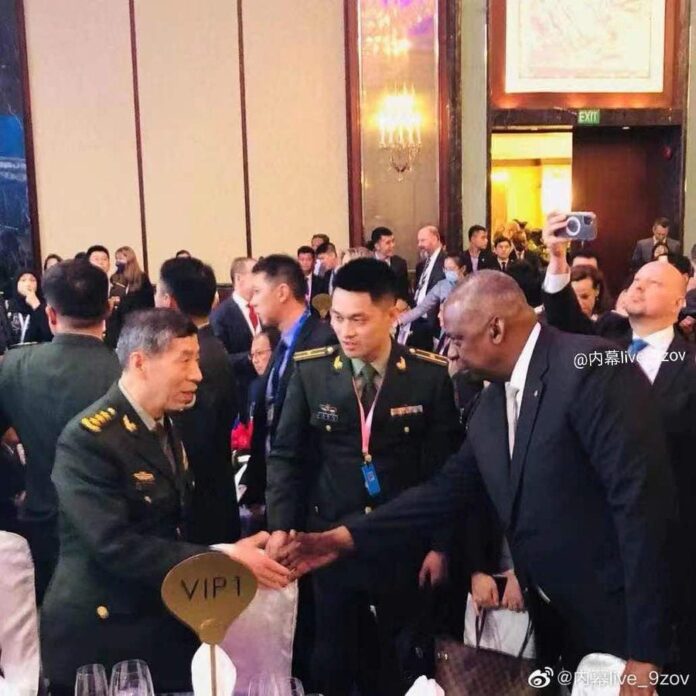
Secretary of Defense Lloyd Austin sought out communist Chinese Defense Minister Li Shangfu for a handshake at the security summit in Singapore Friday. The two men spoke briefly, Shangu could be seen smiling as they shook hands.
As TGP’s Cristina Laila reported earlier this week, The Pentagon released a statement announcing China had rejected Austin’s request for a meeting with Shngfu at the summit but had been rejected by China:
“Overnight, the PRC informed the U.S. that they have declined our early May invitation for Secretary Austin to meet with PRC Minister of National Defense Li Shangfu in Singapore this week. The Department believes strongly in the importance of maintaining open lines of military-to-military communication between Washington and Beijing to ensure that competition does not veer into conflict.”
Pentagon spokesman Brig. Gen. Patrick Riley issued a statement Friday on the handshake:
“Secretary Austin and PRC Minister of National Defense Li Shangfu spoke briefly at tonight’s opening dinner of the Shangri-La Dialogue in Singapore. The two leaders shook hands, but did not have a substantive exchange. The Department believes in maintaining open lines of military-to-military communication with the PRC — and will continue to seek meaningful military-to-military discussions at multiple levels to responsibly manage the relationship.”
Wall Street Journal reporter Yaroslav Trofimov posted video of the handshake, “The handshake. Defense Secretary Austin walks over to Chinese Defense Minister Li Shangfu to say hello at the #SLD23 in Singapore. Li had turned down the U.S. proposal for a meeting.”
The handshake. Defense Secretary Austin walks over to Chinese Defense Minister Li Shangfu to say hello at the #SLD23 in Singapore. Li had turned down the U.S. proposal for a meeting. pic.twitter.com/t9KkUI3vSw
— Yaroslav Trofimov (@yarotrof) June 2, 2023
Austin and Shangfu were seated at the same table for the dinner:
As well as the handshake, China’s Defence Minster Li Shangfu had dinner with Australian PM @AlboMP — and, on the same head table, US Defence Secretary Llyod Austin.
Props to the @IISS_org seating committee https://t.co/3UOTAqPQjn pic.twitter.com/KZF9ZNUmtH
— Will Glasgow (@wmdglasgow) June 2, 2023
Austin addressed his reasons for wanting to meet with Shangfu at a press conference in Tokyo Thursday with Japanese defense Minister Hamada Yasukazu (Pentagon transcript):
The second question that you asked was regarding declining — the Chinese declining to meet with me, the minister of defense declining to meet with me. I think that’s unfortunate, but we’re going to continue to do what we are doing in this region and others, and that is to work with like-minded countries who share common values and common goals to continue to promote a free and open Indo-Pacific. And again, you’ve heard me talk a number of times about the importance of countries with — large — with significant capabilities being able to talk to each other so you can — you can manage crises and — prevent things from spiraling out of control unnecessarily.
And as we take a look at some of the things that China is doing in the international airspace in the region and the international waterways, you know, the provocative intercepts of our aircraft and also our allies’ aircraft, that’s very concerning, and we would hope that they would alter their actions. But since they haven’t yet, I’m concerned about, at some point, having an incident that could very, very quickly spiral out of control.
But again, I would welcome any opportunity to engage with leadership. I think defense departments should be talking to each other on a routine basis, or should have open channels for communication, so…
Link to the speaker agenda for the summit, which runs from June 2 through June 4. The formal name is the IISS Shangri-La Dialogue (The International Institute for Strategic Studies).


